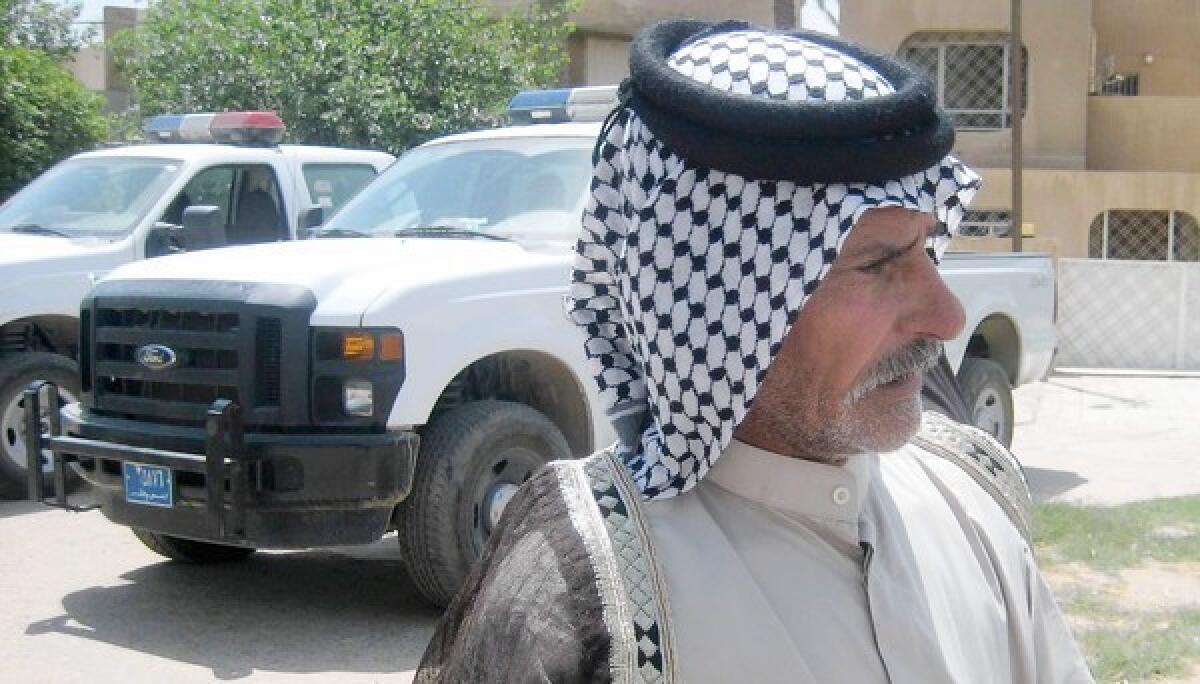Iraq slaying victims’ families wait for word about the accused

- Share via
Reporting from Baghdad — The small group of men and women wait outside concrete barriers leading to Iraq’s Central Criminal Court. They stand by the cheap wooden falafel stand, or the shade of the few green bushes. All of the men smoke.
Lawyers dressed in suits and ties drive up and are ushered through a checkpoint by soldiers.
Inside, both innocent and guilty languish without trial, sometimes for years. For ordinary citizens on the outside, hoping for word from the courts on the cases of those they believe killed their relatives, the courts and detention centers are mysterious and out of reach.
Rumors spread like wildfire. The relatives worry that the killers of their loved ones will be freed as part of a larger detainee release. They know that politicians have been demanding the release of thousands of prisoners who have been held without charge.
The victims’ relatives all hold papers with official seals that they say are evidence of the defendants’ guilt. Each has suffered the emotional toll of sectarian violence since 2003, but none believe they received justice.
Most people here can bear witness to the violence of the Sunni Arab militant group Al Qaeda in Iraq. None this day have stories of killings carried out by Shiite Muslim militias.
One woman said she watched militants execute her husband; they then fled to the safety of another neighborhood.
Hamid Kadhim, a middle-aged civil servant, stood in his white robe and checkered headdress outside the courthouse gates, where he has spent too much time in recent years.
“We always come here,” he said. His son, Ali, was killed in October 2008.
He is sure the men who did it belonged to Al Qaeda in Iraq. Six months ago, he learned that the five men actually had been jailed. So now he waits, hoping to catch the eye of a lawyer or investigator or just trade notes with other relatives.
“They never let us in the courthouse,” Kadhim said.
He said he has heard rumors that the suspects have been shuffled between detention facilities, and he does not know whether they will be convicted.
“I am afraid that they will be released,” Kadhim said. Specifically, he worries that the families of the accused will pay off court officials to win their release.
Those waiting each have their story and they trade information. One man holds a notebook with details of his son’s disappearance in Baghdad on May 7, 2006, never to be seen again.
Another man, Alaa Mohammed Jassim, believes that his brother was killed in 2004 by the same Al Qaeda in Iraq group that killed Kadhim’s son.
Like his friend, he is convinced that investigators are taking bribes and letting suspects go. Jassim used to come to the courthouse every month, but as time drags on he comes less frequently.
The relatives here on the outside are powerless; the accused are actually in a stronger position, he said.
Someday the courts might improve, he said. But now? “They cannot punish the criminals,” Jassim said.
Salman is a Times staff writer.
More to Read
Sign up for Essential California
The most important California stories and recommendations in your inbox every morning.
You may occasionally receive promotional content from the Los Angeles Times.










